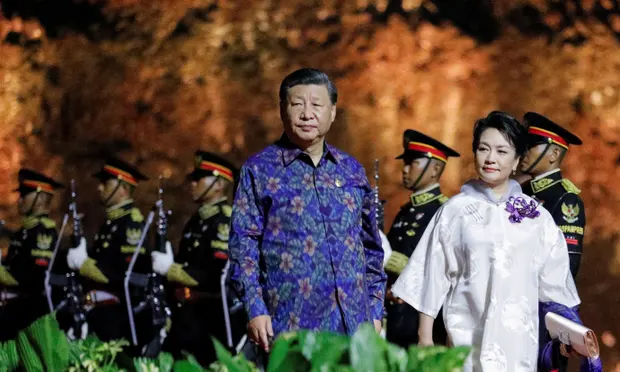Chinese police have started targeting participants of last weekend’s mass protests against the communist regime’s harsh COVID-19 policies, according to reports, suggesting the surveillance state is kicking into full gear in response to the country’s biggest display of civil disobedience in decades.
Two protesters told Reuters that callers identifying themselves as Beijing police officers asked them to report to a police station on Tuesday with written accounts of their activities on Sunday night. A student also said they were asked by their college if they had been in an area where a protest happened and to provide a written account.
“We are all desperately deleting our chat history,” said another person who witnessed the Beijing protest and declined to be identified. The person said police asked how they heard about the protest and what was their motive for going.
On Monday, a female demonstrator also told AFP that she and five of her friends were contacted by the city’s police, asking whether they attended the protests near Liangma River in Beijing. In one case, the police officers visited the home of her friend, who refused to answer their call, the woman, who declined to be identified, said.
While it is unclear how the police managed to identify these demonstrators, a Chinese lawyer told Wall Street Journal that she suspected police used data on protesters’ mobile phones, including those collected by the regime’s mandatory COVID tracing app, to ascertain their identities. The lawyer, Wang Shengsheng, provided legal support for over 20 demonstrators after they received calls from the police.
Meanwhile, police officers patrolled streets in Beijing and other Chinese cities on Monday night to prevent a repeat of the weekend’s demonstrations.
Many in Shanghai directed their anger at the Chinese Communist Party (CCP) and its top leader Xi Jinping. “Communist Party, step down! Xi Jinping, step down!” crowds repeatedly chanted at Saturday’s rally on Wulumuqi street.
Hundreds of Beijing residents holding candles and blank white paper as an expression of protest gathered at Liangma Bridge on a freezing night on Sunday. Cars passing by honked in a show of support.
Protests reportedly planned in Beijing on Monday night were canceled. The site where chat groups on Telegram had suggested people gather again buzzed with flashing lights from police cars, according to online footage and Reuters. Police officers also patrolled the site to ensure no gatherings took place.
In the financial hub of Shanghai, high metal barriers have been erected along sites where protests erupted, local residents told The Epoch Times. At Wulumuqi Road, the site of the weekend protests, one AFP journalist identified 12 police cars within 330 feet (100 meters) along the street.
Detentions
Witnesses say demonstrators were detained after the protests, although it is not clear exactly how many had been detained.
A young woman who joined Saturday’s protest in Shanghai said she saw that three demonstrators were arrested before she left the site at around 8 p.m. “Crowds yelled ‘Release them!” But they were still taken away,” she told The Epoch Times.
As of Tuesday, Chinese authorities and state-backed media remained silent on the protests.
While protests did not continue in major Chinese cities after the weekend, they did continue elsewhere.
Holding white papers, some young students gathered at Hong Kong’s central business district, the scene of the mass pro-democracy movement in 2019.
About 50 students also gathered at the campuses of the Chinese University of Hong Kong to mourn the victims in Xinjiang, online footage shows.
Footage shows hundreds of police occupying a large square in the city, preventing people from congregating. One video showed police, surrounded by a small crowd of people holding smartphones, making an arrest while others tried to pull back the person being detained.
Official Response
Asked if the authorities would reconsider its zero-COVID policy, Mi Feng, spokesperson for China’s health commission, told reporters at a Tuesday briefing that the regime is “constantly fine-tuning” its COVID prevention measures.
Another health official suggested complaints over the regime’s COVID controls were directed at local officials’ inflexible implementation rather than the approach itself.
“The problems highlighted by the public are not aimed at the epidemic prevention and control itself, but focus on simplifying prevention and control measures,” Cheng Youquan, a supervisory official at the National Disease Control and Prevention Administration, said at Tuesday’s briefing.
Meanwhile, hundreds of millions of Chinese have experienced sporadic lockdowns upending daily life and causing severe hardship to many, including being deprived of access to health care and even resulting in deaths from harsh quarantine conditions.
On Monday, local authorities in Beijing and several cities eased COVID regulations to a certain extent, though most of the requirements remain. Analysts, however, do not expect a U-turn of the zero-COVID policy, which the CCP and Xi have cast as an approach superior to the West’s pandemic response.
Without mentioning the recent unrest, a Tuesday editorial piece in People’s Daily, the CCP’s official mouthpiece, once again urged citizens to “unswervingly implement” COVID policies.
“The harder it is, the more you have to grit your teeth,” it said.
“Can you release our residential community to get some food while you modify the policy?” a Chinese netizen wrote on Weibo, China’s version of Twitter. “We will really go crazy if the lockdown continues. We can’t live [with] it anymore.”
Gu Xiaohua and Reuters contributed to this report.



